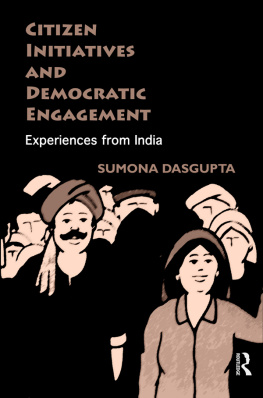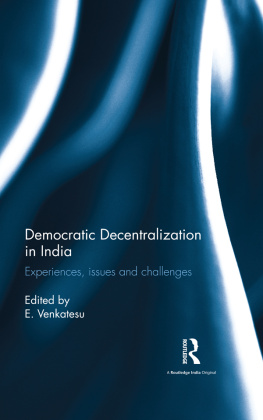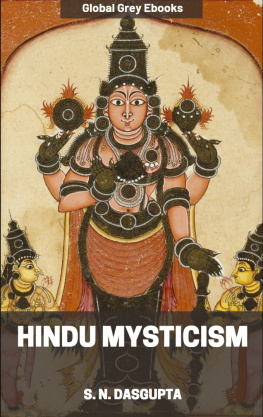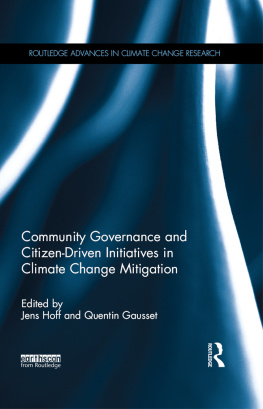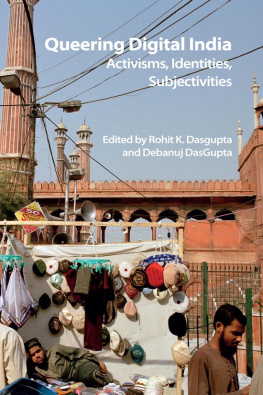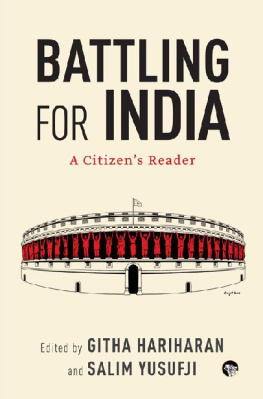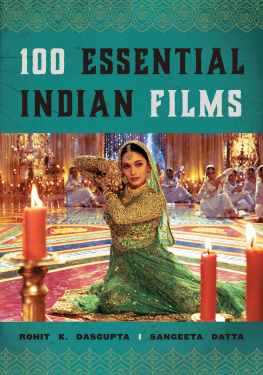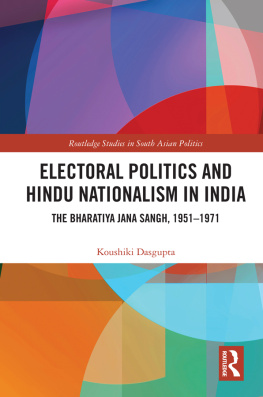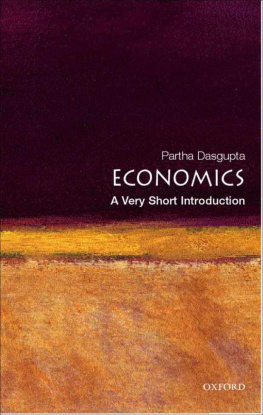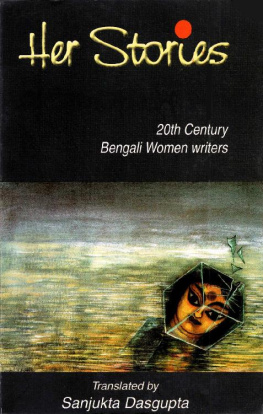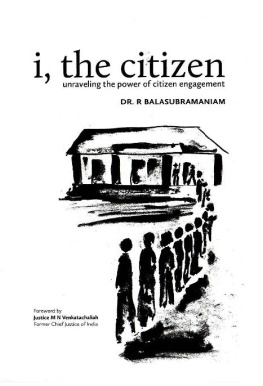Citizen Initiatives and Democratic Engagement
Citizen Initiatives and Democratic Engagement
Experiences from India
Sumona DasGupta
First published 2010
by Routledge
912915 Tolstoy House, 1517 Tolstoy Marg, New Delhi 110 001
Simultaneously published in the UK
by Routledge
2 Park Square, Milton Park, Abingdon, OX14 4RN
Routledge is an imprint of the Taylor & Francis Group, an informa business
2010 Society for Participatory Research in Asia (PRIA)
Typeset by
Star Compugraphics Private Limited
D156, Second Floor
Sector 7, Noida 201 301
All rights reserved. No part of this book may be reproduced or utilised in any form or by any electronic, mechanical or other means, now known or hereafter invented, including photocopyitng and recording, or in any information storage and retrieval system without permission in writing from the publishers.
British Library Cataloguing-in-Publication Data
A catalogue record of this book is available from the British Library
ISBN: 978-0-415-59632-9
Contents
ADC Additional Deputy Commissioner
BDPO Block Development and Panchayat Officer
CENSORED Centre for Communication Resources Development
COVA Confederation of Voluntary Associations
CSO Civil Society Organisations
CWS Centre for World Solidarity
DBF Dalit Bahujan Front
DDNN Deccan Development NGO Network
ECI Election Commission of India
EPG Empowered Participatory Governance
EVMs Electronic Voting Machines
FIR First Information Report
GSM Gram Sabha Mobilisation
IAS Indian Administrative Services
IFCB International Forum on Capacity Building
MKSS Mazdoor Kisan Sangharsh Samiti
NEW National Election Watch
NGOs Non-Governmental Organisations
NREGA National Rural Employment Guarantee Act
OBCs Other Backward Classes
PCMU Procurement and Contract Management Unit, PRIA
PEVAC Pre-Election Voters' Awareness Campaign
PRI Participatory Research Institute
PRIA Society for Participatory Research in Asia
PRJA Panchayati Raj Jagrukta Abhiyan
RGF Rajiv Gandhi Foundation
RPSC Rajasthan Public Service Commission
SEC State Election Commission
SEWA Society for Education and Welfare Activities
SP Superintendent of Police
TOT Training of Trainers
UNICEF United Nations Children's Fund
I t was during a discussion with local citizens in some villages of Mandi district of Himachal Pradesh in October 1995 that the suggestion was made to us at Society for Participatory Research in Asia (PRIA) that we start an exercise to inform voters and candidates about the salience of the forthcoming elections to institutions of self-government in India. These were the first elections to be held following two Constitutional Amendments to the Constitution of India (the 73rd and 74th Amendments) which conferred constitutional sanctity to units of local self-government and made elections to these bodies mandatory.
The PRIA field staff along with a handful of local activists made a modest attempt in 23 blocks of Mandi and Dharamshala districts of Himachal Pradesh to inform some citizens about their rights to elect their panchayat representatives (as representatives of rural local self-governing units are called in India) in the elections held during December 1995. This small effort taught us several lessons, and suggested that a deeper engagement is necessary to support women and others from historically-disadvantaged sections to contest these elections without fear or favour. Their active participation as candidates could not be taken for granted. This was because their election to units of self-governance would clearly challenge the existing power relationships in India's village communities across the country. The disturbance of the existing status quo that is inevitable in the processes of social transformation would necessarily bring turbulence of varying degrees in its wake. Consequently, the newly-elected representatives needed to be supported in this period of transition both during and after the election to the (now constitutionally endorsed) local institutions of self-governance.
However, by the time this idea of civil society intervention gained momentum the first round of elections under the new amendment acts of India that provided a constitutional sanctity to rural and urban units of local self-governance was already completed. PRIA began to discuss these ideas with its partner civil society groups in other states, and it was decided to attempt a campaign that came to be known as Pre-Election Voters' Awareness campaigns (PEVAC) well in advance of the second round of panchayat elections beginning in 2000. The subsequent PEVAC experience taught us the value of this campaign not only for the voters and contestants, but also for election authorities.
For us, the scale of PEVAC in 2000 was immense; no such civil society engagement in formal electoral process had been attempted in India (and for that matter in any other country) before. The support from some of the State Election Commissions (SECs) further encouraged PRIA to scale it up in the next round which began from 200405. Nearly half the rural population of the states where PEVAC was launched (estimated to be about 150 million voters from the states of Madhya Pradesh, Chattisgarh, Rajasthan, Haryana, Uttar Pradesh, Kerala, Andhra Pradesh, Himachal Pradesh and Gujarat) was covered by a coalition comprising several hundred civil society groups in each state. For the first time, PEVAC was also launched in urban municipalities.
As the fourth round of panchayat elections started from January 2010, the model of civil society engagement has been substantially institutionalised. PEVAC has demonstrated the potential for inclusive democracy based on dialogue and participation of the people. Sometimes, the civil society interventions have taken the form of a more institutionalised programme such as the Panchayati Raj Jagrukta Abhiyan (PRJA).
This book entitled Citizen Initiatives and Democratic Engagements: Experiences from India by Sumona DasGupta tells the story of this campaign, and captures its excitements and constraints, its possibilities and limitations as experienced by actors in the field. DasGupta anchors this story in the larger global discourses on deepening democracy and the book will consequently be of interest to all those interested in issues related to comparative democratisation as well as the scope of civil society initiatives in India.
The book critically assesses the strategy and methodology of this large-scale campaign and its follow ups. In explicating the strategy of the campaign it also examines the role of the SEC in initiating and sustaining democratic engagements at the grass-roots level. In fact in the course of the PEVAC experience, PRIA also learnt a great deal about the electoral system in the country, and the ways in which it needs to be further reformed, if the citizens' faith in democracy is to be sustained and deepened.
The Election Commission of India (ECI) has recently celebrated 60 years of its existence. It has acquired a strong reputation as being an independent and non-partisan regulator of elections to assemblies and parliament in India. Its expertise is sought internationally, and its procedures are recognised as robust. This was, however, not the case till recently. It was only during Mr T. N. Seshan's tenure as Chief Election Commissioner (199096) that debates around the independence of the ECI were foregrounded and best practices institutionalised. The SECs are less than 20-years-old, and the critical question is, what are the precedents we can draw on from the experience of the ECI to ensure that the SECs remain non-partisan and impartial since the success or otherwise of local-level elections will depend on this. What has the ECI done to pass on its best practices and expertise to the various SECs? The irony is that many states in the country today continue to have two different sets of electoral rolls one prepared by ECI, and another by SEC because ECI has not modified its classification of voters to bring it in line with the jurisdictions of panchayats and municipalities!


